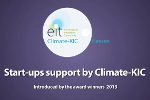Horizon scanning the European Bio-Economy (Biohorizons)
Challenge Platform: Bio-Economy
Project Start Date: 10/2013
Lead partner: Institute of Biological, Environmental and Rural Science (IBERS) – Aberystwyth University, UK
Project type: Pathfinder – Explores relevant climate arenas to identify and prioritise innovation opportunities
Project lead: Dr. Edward Hodgson, IBERS
Partners
This project involves 9 partners in 7 European countries:
- Aberystwyth University (IBERS), UK
- Imperial College London (ICEPT), UK, (Climate-KIC Core Partner)
- Instituto Nacional de Reforma Agraria (INRA), France
- University of Kassel - Centre for Environmental Systems Research (CESR), Germany
- University of Valencia, Spain
- University of Bologna (UNIBO), Italy
- Negos, Hungary
- The National Non-Food Crops Centre (NNFCC), UK
- South Pole Carbon Asset Management, Switzerland
Concept
With bio-economy holding the key to unlocking new and sustainable resources, more needs to be known about the current landscape of the industry across Europe. The Biohorizons project is focused on mapping the bio-economy industry to identify areas for growth, opportunity and innovation.
The climate change issue
Demographic and climatic changes are putting the world’s resources under increasing pressure. With the global population expected to reach 9 billion by 2050, the demand for resources is growing quickly. Simultaneously, climate change is forcing us to reduce our consumption of fossil fuels in favour of sustainable alternatives. The bio-refining of fuels and chemicals has the potential to offer new and sustainable sources for resources. However, the bio-economy market is in its infancy and it is still unclear how its research-based and commercial outputs can be best put into practice.
The Project Solution
Biohorizons is working to deliver the necessary framework needed to support climate change mitigation strategies through business innovation in the bio-economy sector. The pathfinder project aims to map the current European bioeconomic landscape by quantifying and characterising existing bio-based businesses and supply chains. This will help identify any barriers to growth and areas where innovation would have a high chance of success. In order to complete this analysis, Biohorizons is developing a pan-European network of research centres, business and development hubs, and industrial partners. Through this they will collate the research they need on regional differences in bio-economic development. The Biohorizons project is the first business and market data assessment of the bio-economy landscape in Europe.
The role of Climate-KIC
Climate-KIC has enabled easy communication between different European partners, providing a network in which to focus discussions and align different kinds of thinking and project ideas. By enabling networking across diverse disciplines, the project has access to a broad pool of knowledge, including in areas which hadn’t previously been considered relevant or important to research. Climate-KIC’s involvement has helped to connect the project lead of IBERS at Aberystwyth University with partners including Imperial College and the NNFCC in the UK, INRA in France, Bologna University in Italy, Kassel University in Germany, Biopolus Institute and NEGOS in Hungary, University of Valencia in Spain and the Global company South Pole Carbon.
Fact sheets
The NNFCC fact sheets are an outcome of the Biohorizons project. They provide a short summary of how bio-economy is supported in different countries across the EU. Please find below the fact sheets:
for the EU: http://www.nnfcc.co.uk/publications/bioeconomy-factsheet-europe/at_download/file
for Germany: http://www.nnfcc.co.uk/publications/bioeconomy-factsheet-germany/at_download/file
Further fact sheets are available on the NNFCC Website.



